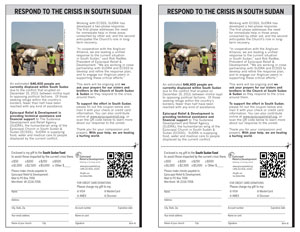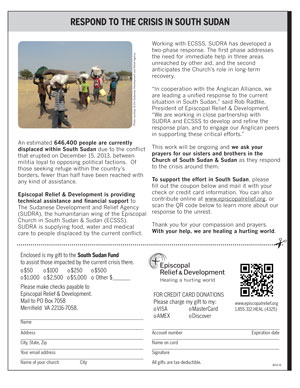Church Agencies Unite to Support South Sudan Relief and Recovery
 Download Half Page Insert (PDF | JPG) |
The Sudanese Development and Relief Agency (SUDRA), the humanitarian wing of the Episcopal Church in South Sudan & Sudan (ECSSS), is supplying food, water and medical care to people displaced by the conflict currently enveloping the world’s newest nation. Episcopal Relief & Development is providing technical assistance and financial support to SUDRA, and serving as the key liaison for a group of Anglican Communion organizations supporting the relief and recovery work.
“In cooperation with the Anglican Alliance, we are leading a unified response to the current situation in South Sudan,” said Rob Radtke, President of Episcopal Relief & Development. “We are working in close partnership with SUDRA and ECSSS to develop and refine the response plan, and to engage our Anglican peers in supporting these critical efforts.”
According to a recent UN OCHA situation report, an estimated 743,400 people* are currently displaced within South Sudan due to the conflict that erupted on December 15, 2013, between militia loyal to opposing political factions. Of those seeking refuge within the country’s borders, fewer than half have been reached with any kind of assistance. An additional 130,400* individuals have fled to neighboring countries. Reports from Juba indicate that some displaced people are sheltering in homes abandoned during the last outbreak of violence in December, to which the owners have yet to return. South Sudan has suffered periodic resurgences of conflict since it peacefully separated from Sudan in a referendum vote in 2011.
Working with the group of Anglican and Episcopal agencies, ECSSS and SUDRA have developed a two-phase response to the current crisis. The first phase addresses the need for immediate help in three areas unreached by other aid, and the second anticipates the Church’s role in long-term recovery.
The aim of Phase 1 activities is to reach 5,500 households (44,000 people) in Awerial, Nimule and the area around Juba with food packs distributed by volunteers and medical assistance provided at ECSSS clinics. The food packs will contain staples such as cornmeal, beans, lentils and milk, and also include bars of soap to enable proper hand-washing and curtail the possible spread of disease in the camps. Healthcare-related items such as antibiotics, oral rehydration salts, malaria test kits and first aid supplies will support the work of Church clinics in Awerial and Juba and a mobile clinic to be established in Nimule. An important aspect of this initial work is registering displaced people and assessing needs, as this information will guide future response work and prevent duplication of efforts.
The estimated timeframe of Phase 1 activities is four to six weeks, scaling back as the wider humanitarian community implements its larger response during that time. The Church will then develop its Phase 2 plan, focusing on the resettlement and rehabilitation of impacted communities. Long-term recovery work, including psychosocial counseling and programs to foster reconciliation, is an ongoing part of ECSSS’ ministry.
“It is most important for the Church to conduct holistic ministry,” said an ECSSS priest involved in the response. “We need to look into the spiritual and social well-being. We try to help with food and with health care. The Church will also be very instrumental as this community starts to consider returning. People also need trauma counseling, some have lost loved ones, some have seen dead bodies or people being killed. The Church will be very instrumental here, it is the special institution to deliver counseling.”
In order to coordinate its response to the current crisis, ECSSS has activated its diocesan Disaster Risk Reduction teams to assess needs and distribute items through volunteers at the local level. These three-person teams – made up of the Diocesan Secretary, the Development Officer and the Mother’s Union Coordinator, with leadership from the diocesan bishop – had received prior training from SUDRA in partnership with Episcopal Relief & Development and Christian Aid.
At the national level, ECSSS Archbishop the Most Rev. Daniel Deng Bul has appointed an Emergency Crisis Committee (ECC) to network with the wider humanitarian community and direct resources according to priority. The ECC is made up of Church department heads and chaired by the Bishop of Bor, the Rt. Rev. Ruben Akurdit. The Food and Health subcommittees of the ECC are tasked with procuring their respective aid items and delivering them to the Disaster Risk Reduction teams in impacted dioceses.
“The Church in South Sudan has adapted its structure to meet, in a unified way, the massive challenges of mobilizing a response in circumstances of wide-spread conflict,” said Nagulan Nesiah, Program Officer for Episcopal Relief & Development. “The relief and development agencies of various Anglican Communion church bodies have also unified their efforts via the Anglican Alliance in order to ensure that the generous outpourings of support from around the globe can have the greatest possible impact.”
Because of its deep relationships and trusted reputation in communities throughout South Sudan, ECSSS is able to reach remote or otherwise inaccessible areas to deliver aid and gain insight regarding circumstances and needs. Episcopal Relief & Development will continue to accompany ECSSS and SUDRA as they monitor and respond to the unfolding crisis.
“I am grateful to the staff of fellow Anglican Alliance member agencies, and most of all to our partners in South Sudan, for their efforts to strengthen and support the Church in dealing with a disaster of this scale,” Program Officer Nesiah said. “I would urge everyone to keep South Sudan in their prayers, that peaceful negotiations will bring the conflict to an end and that people may soon return home.”
The Presiding Bishop of The Episcopal Church has issued a statement calling for a Day of Prayer for South Sudan on February 16. Read the full statement here.
Please visit Episcopal Relief & Development’s South Sudan updates page for the latest news and resources to engage churches in supporting the response.
Episcopal Relief & Development is the international relief and development agency of the Episcopal Church and an independent 501(c)(3) organization. The agency takes its mandate from Jesus’ words found in Matthew 25. Its programs work towards achieving the Millennium Development Goals. Episcopal Relief & Development works closely with the worldwide Church and ecumenical partners to help rebuild after disasters and to empower local communities to find lasting solutions that fight poverty, hunger and disease, including HIV/AIDS and malaria.
*Figures have been updated



